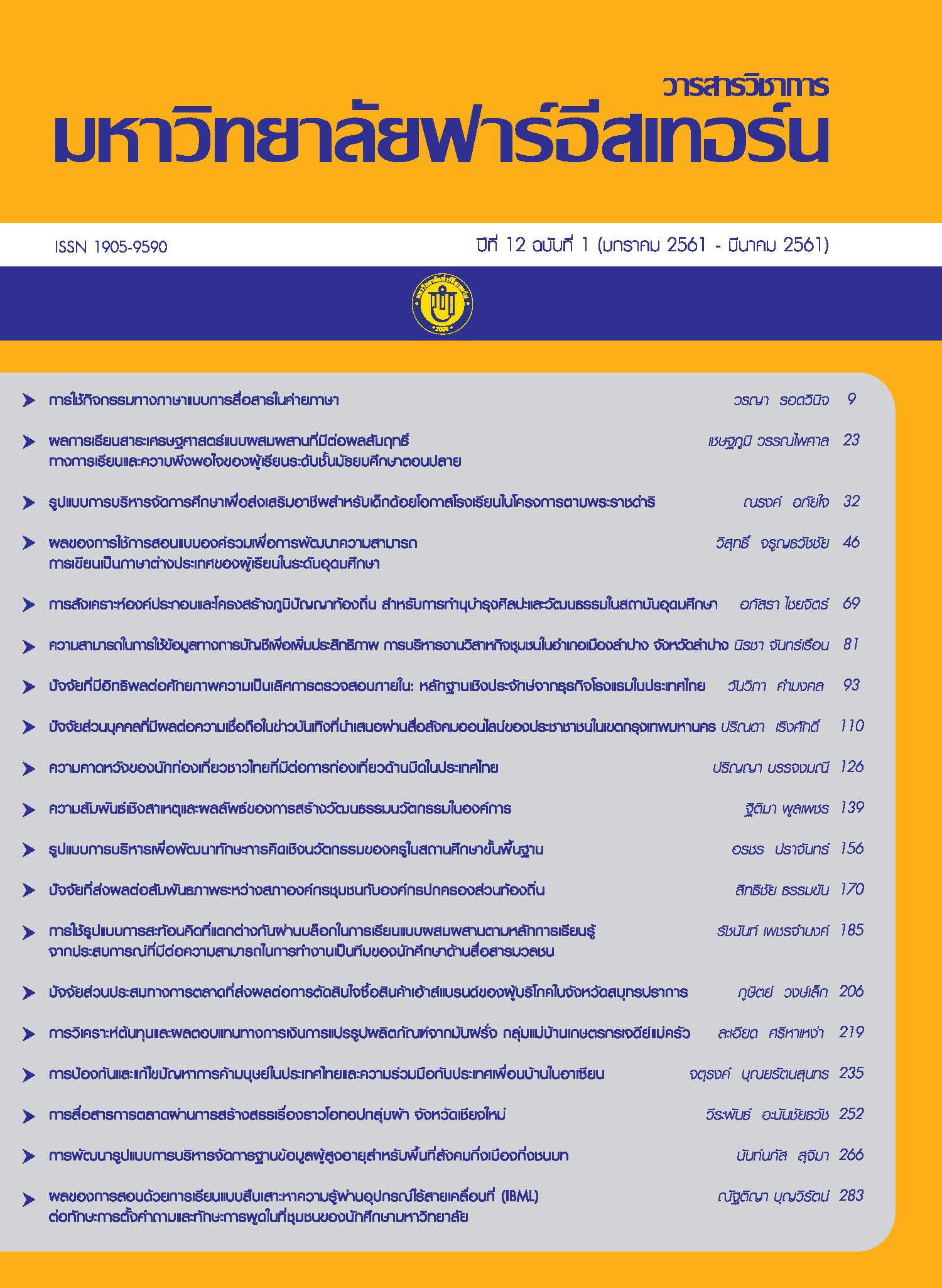ผลการเรียนสาระเศรษฐศาสตร์แบบผสมผสานที่มีต่อผลสัมฤทธิ์ทางการเรียน และความพึงพอใจของผู้เรียนระดับชั้นมัธยมศึกษาตอนปลาย
Main Article Content
Abstract
การวิจัยครั้งนี้มีวัตถุประสงค์เพื่อ 1) เปรียบเทียบผลสัมฤทธิ์ทางการเรียนสาระเศรษฐศาสตร์ระหว่างนักเรียนที่เรียนรู้ด้วยวิธีการจัดการเรียนการสอนแบบปกติกับนักเรียนที่เรียนรู้ด้วยวิธีการเรียนการสอนแบบผสมผสาน และ 2) ศึกษาระดับความพึงพอใจต่อบทเรียน เรื่อง เศรษฐศาสตร์เบื้องต้นและอุปสงค์อุปทาน โดยใช้ระเบียบวิธีวิจัยเชิงบรรยาย กลุ่มตัวอย่างในการวิจัยประกอบด้วย นักเรียนระดับชั้นมัธยมศึกษา ตอนปลาย จำนวน 990 คน ที่กำลังศึกษาในโรงเรียนประจำจังหวัด สังกัดสำนักงานศึกษาธิการภาค 15 โดยการเลือกแบบเจาะจง ได้แก่ โรงเรียนยุพราชวิทยาลัย จังหวัดเชียงใหม่ โรงเรียนห้องสอนศึกษา จังหวัดแม่ฮ่องสอน โรงเรียนบุญวาทย์วิทยาลัย จังหวัดลำปาง และโรงเรียนจักรคำคณาทร จังหวัดลำพูน ภาคเรียนที่ 2 ปีการศึกษา 2558 เครื่องมือที่ใช้ในการวิจัย ได้แก่ บทเรียน E-Learning เรื่องเศรษฐศาสตร์เบื้องต้นและ อุปสงค์อุปทาน แบบทดสอบปลายภาค และแบบประเมินความพึงพอใจของนักเรียนที่มีต่อบทเรียน E-Learning วิเคราะห์ข้อมูลด้วยสถิติ ค่าความถี่
ร้อยละ ค่าเฉลี่ยเลขคณิตและส่วนเบี่ยงเบนมาตรฐาน ผลการวิจัยพบว่า 1) ค่าเฉลี่ยของผลสัมฤทธิ์ทางการเรียนของนักเรียนกลุ่มทดลองที่มีรูปแบบการเรียนสาระเศรษฐศาสตร์แบบผสมผสานมีค่าเฉลี่ยแตกต่างกับผลสัมฤทธิ์ทางการเรียนของนักเรียนกลุ่มควบคุม และ 2) ค่าเฉลี่ยความพึงพอใจต่อรูปแบบการเรียนสาระเศรษฐศาสตร์แบบผสมผสานที่ใช้บทเรียน E-Learning ในการเรียนการสอน มีค่าเฉลี่ยรวมอยู่ในระดับมากและหัวข้อการประเมินเพื่อวัดระดับความพึงพอใจต่อบทเรียนของนักเรียนอยู่ในระดับมากทุกข้อ
The purposes of this research were 1) to compare the achievement of economics learning between students who learn with conventional teaching and students who learn with blended learning pattern and 2) to study the satisfaction level of E-learning lessons on the topic of “General economics and demand vs supply”. This research was conducted by using descriptive research methodology. The sample group comprised of 990 senior high school students, studying at provincial schools under the supervision of the Regional Education Office No.15. Purposive sampling in this research includes Yupparaj Royal’s College – Chiang Mai province, Hongsonsuksa school - Maehongson province, Bunyawat Witthayalai School - Lampang province, and Chak Kham Khanathon school- Lumphun province. The data collecting period was during the second semester of 2015. The research instruments were E-learning lessons on the topic of “General economics and demand vs supply”, final test, and an evaluation form of students’ satisfaction towards the lessons on E-Learning. Statistics employed for analysis were frequency, percentage, arithmetic mean, and standard deviation. The findings can be summarized as follows: 1) the mean values of students’ achievement in the experimental group, with blended learning pattern in Economics lessons, were different from the control group and 2) the overall mean values of students’ satisfaction towards blended learning in Economics lessons were at high levels and all the satisfaction evaluating points in the evaluation form were also at high levels.
Article Details
1. Any views and comments in the Journal of Social Innovation and Lifelong Learning are the authors’ views. The editorial staff have not to agree with those views and it is not considered as the editorial’s responsibility.
2. The responsibility of content and draft check of each article belongs to each author. In case, there is any lawsuit about copyright infringement. It is considered as the authors’ sole responsibility.
3. The article copyright belonging to the authors and The Far Eastern University are copyrighted legally. Republication must be received direct permission from the authors and The Far Eastern University in written form.
References
การศึกษาขั้นพื้นฐาน, สำนักงานคณะกรรมการ. (2559). ข้อมูลจำนวนนักเรียน ปีการศึกษา 2558. กลุ่มสารสนเทศ สำนักนโยบายและแผน สำนักงานคณะกรรมการการศึกษาขั้นพื้นฐาน.
เชษฐภูมิ วรรณไพศาล. (2559). หลักเศรษฐศาสตร์สำหรับครูมัธยมศึกษา. เชียงใหม่: โชตนาพริ้นท์.
ศรีศักดิ์ จามรมาน. (2549). อีเลิร์นนิ่งระดับปริญญาผุดขึ้นมามากมาย : การศึกษาออนไลน์ในสหรัฐอเมริกา พ.ศ.2548. กรุงเทพฯ: สำนักพิมพ์มหาวิทยาลัยอัสสัมชัญ.
Mayer, R.E. (2005). The Cambridge handbook of multimedia learning. New York: Cambridge University Press.
Waterhouse, S.A. (2005). The Power of E-learning: The essential guide for teaching in the digital age. Boston: Pearson Education.

